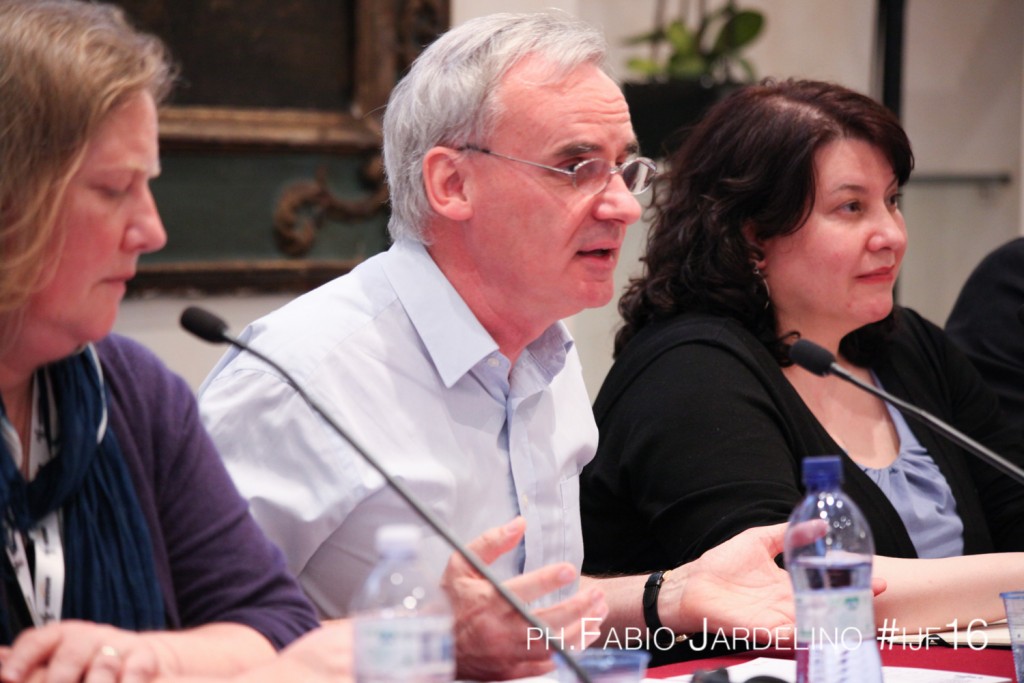 When Wikileaks released the “Afghan War Diary” and the “Iraq War Logs” in 2010, it was a treasure trove for journalists. “We thought, ‘This is as good as it gets. We’re never going to have a leak on this scale again,’” The Guardian correspondent Ewen MacAskill said during the panel “Journalism after Snowden” at the International Journalism Festival in Perugia. Then, “along comes (Edward) Snowden and we get another fantastic leak. Then you think we’re never going to get leaks like this again.” Then “John Doe” released the Panama Papers. “It’s so easy now for whistleblowers,” MacAskill said. “You take a memory stick and you can download all this data.” And the whistleblowers can use the Internet to share it with journalists anywhere in the world.
When Wikileaks released the “Afghan War Diary” and the “Iraq War Logs” in 2010, it was a treasure trove for journalists. “We thought, ‘This is as good as it gets. We’re never going to have a leak on this scale again,’” The Guardian correspondent Ewen MacAskill said during the panel “Journalism after Snowden” at the International Journalism Festival in Perugia. Then, “along comes (Edward) Snowden and we get another fantastic leak. Then you think we’re never going to get leaks like this again.” Then “John Doe” released the Panama Papers. “It’s so easy now for whistleblowers,” MacAskill said. “You take a memory stick and you can download all this data.” And the whistleblowers can use the Internet to share it with journalists anywhere in the world.
Technology has given us an “extraordinary opportunity,” said Charlie Beckett, founding director of Polis. In addition to increasing and improving leaks, technology has increased collaboration among journalists. More than 400 journalists with various skills from more than 100 news organisations of various sizes in nearly 80 countries worked together for about a year to review the documents and data and investigate. They published their first reports on April 3, and MacAskill said, “the impact is much more powerful if it had only been a handful or one organisation involved.” Beckett said collaboration will lead to more creativity in reporting and writing. There’s a darker side to the technology and the leaks: We now know what governmental bodies around the world are capable of seeing and we’ve seen how government reacts to the leaks.
Before the leaks, journalist and author Stefania Maurizi didn’t have any colleagues who used encryption to communicate with sources, she said. “Use of encryption – encrypted chat and encrypted platforms – is now sort of normal,” MacAskill said. And still Maurizi and Der Spiegel writer Marcel Rosenbach fear that is not enough to protect their sources. “Your email, your mobile phone, even encryption can be bypassed,” Maurizi said. “Sources need to be aware that when they call us – when they reach us through an email – that metadata may last forever.” And the whistleblowers need to understand that, depending on their country’s legislation, they could go to prison. “Chelsea Manning is in prison. Edward Snowden is in exile in Russia. Julian Assange is arbitrarily detained in an embassy,” Maurizi noted.
Rosenbach said governments also have attempted to villainize journalists who publish leaked information. He pointed out that some who published the information Snowden leaked have been referred to as “accomplices.” Journalists have to be careful and creative in finding ways to communicate with their sources. “Use your brain,” Rosenbach said. “Change your patterns.” But be careful about how you change your patterns. “If you were journalists that never encrypted anything… I, on the other side, would say, ‘That’s interesting. What’s happening here?’” Rosenbach said.